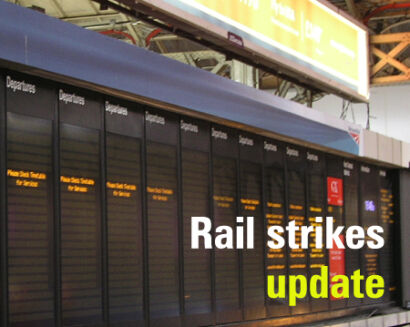Members of the RMT working for most train operators in England are staging a 24-hour strike today, and the stoppage is causing widespread disruption.
Two more strikes have been called for Saturday and 29 July, which is the following Saturday. There will also be major disruption on London Underground next week.
The stoppages have coincided with the start of the peak holiday season.
The union says there have no new talks in the long dispute over pay and conditions on National Rail, and tensions have also been increased by proposals to close most station ticket offices in England, which the RMT opposes.
RMT general secretary Mick Lynch said: ‘I am proud of our members for showing such fortitude and resolve in this long running dispute.
‘Our national dispute is about pay job security and working conditions. The recent attack on ticket offices and the threat to destaff our railways, has galvanised a huge groundswell of public support which we are grateful for.
‘Our members and our union will not be cowed by rail bosses or government ministers and our dispute will continue until we can reach a negotiated settlement.
‘We remain steadfast in our industrial programme and are available for talks 24/7 with the train operating companies.’
The Rail Delivery Group has offered the RMT a backdated pay rise of 5 per cent, followed by 4 per cent this year, in exchange for changes to working practices.
Jacqueline Starr of the RDG described the latest offer as ‘very good’. The RMT rejected this in April, but she said it remained on the table. She added that the RDG was ‘very open to continuing conversations’.
The RMT is also set to stage a ‘week of action’ on the London Underground from 23 to 28 July, when different grades and sections of the staff will strike.
Transport for London says Underground services will finish by 19.00 on 23 July, with a ‘good service expected by late morning’ the following day. But no services are expected to run on 26 and 28 July, and only a few trains on 25 and 27 July. There will be early morning disruption on 29 July, with services returning to normal by midday. TfL warned that where services are running, ‘they will be extremely busy and subject to delay’.
Meanwhile, ASLEF is staging a series of overtime bans, and the latest of these will run until Saturday. It is the third of its kind, because ASLEF had already withdrawn ‘non-contractual’ overtime from 15 to 20 May, and also earlier this month for six days from 3 July. A fourth has been planned between 31 July and 5 August.


